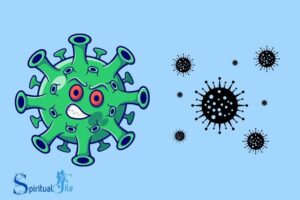Spiritual Nursing Diagnosis Examples: Despair!
Spiritual nursing diagnosis examples include moral distress, spiritual despair, and spiritual distress.
These diagnoses pertain to a patient’s need for psychological support and spiritual guidance. They can also help nurses provide holistic care and build trust with patients.
Spiritual nursing diagnoses are evaluations made by healthcare providers, particularly nurses, that pertain to a person’s spiritual state and its potential or actual effect on their physical health.
These diagnoses are often given to patients who express feelings of despair, moral distress, or spiritual distress.
The aim of these diagnoses is to provide a holistic care approach that not only addresses the physical aspect of a patient’s health but also their psychological needs and spiritual beliefs.
Spiritual nursing diagnoses are an essential part of holistic patient care.
They allow healthcare providers to fully understand their patient’s needs and concerns, enabling them to create a care plan that addresses not only the physical but also the psychological and spiritual aspects of patient health.
Providing this kind of whole-person care can build trust between the patient and provider, leading to improved patient outcomes and satisfaction.
9 Spiritual Nursing Diagnosis Examples Chart
| Spiritual Nursing Diagnosis | Description | Examples |
|---|---|---|
| Spiritual Distress | Expression of suffering related to the inability to integrate meaning and purpose of life with spiritual beliefs | Patient expresses doubts about life’s purpose following a terminal diagnosis |
| Spiritual Anxiety | Experiences of unease, discomfort, or dread related to spiritual aspects | Patient shows high levels of anxiety towards death and afterlife |
| Ineffective Spiritual Coping | Inability to integrate and apply spiritual beliefs in stressful situations | Patient is unable to find solace in their faith during a crisis |
| Risk for Spiritual Distress | Potential for experiencing a disruption in the integration of meaning and purpose of life with spiritual belief, which may disrupt the individual’s peace and inflict mental pain | Patient at risk due to diagnosis of a chronic, debilitating illness |
| Readiness for Enhanced Spiritual Well-being | Possess the ability and determination to enhance spiritual well-being and is ready to engage in activities that will promote this | Patient seeks ways to improve spiritual well-being after overcoming a severe illness |
| Moral Distress | Experiencing inner conflict by participating in or witnessing morally questionable actions | Healthcare worker is struggling with the moral implications of administering end-of-life care |
| Spiritual Alienation | Feeling distant or disconnected from personal spiritual beliefs or from the perceived source of comfort or strength | Patient feels disconnected from their faith community following a major life event |
| Spiritual Despair | A state of extreme loss of hope, sense of meaning in life, and a connection with a higher being | Patient expresses feelings of despair and hopelessness after a personal tragedy |
| Spiritual Guilt | Experiences of self-blame, remorse or regret related to spiritual beliefs, values, or behaviors | Patient expresses guilt for not following certain religious rituals |
Key Takeaway

Five Facts About: Spiritual Nursing Diagnosis Examples
Understanding Spiritual Nursing Diagnosis
Understanding spiritual nursing diagnosis involves recognizing the role of spirituality in healthcare.
Examples of spiritual nursing diagnoses include spiritual distress, compromised religiosity, and readiness for enhanced spiritual well-being.
Nursing professionals can address these diagnoses by providing holistic care that acknowledges the importance of spirituality in a patient’s overall health and well-being.
What Is Spiritual Nursing Diagnosis?
Spiritual nursing diagnosis refers to the process of assessing and identifying the spiritual needs of patients in a healthcare setting. It involves recognizing the beliefs, values, and practices that shape the spiritual dimension of an individual’s life.
This type of diagnosis allows nurses to provide holistic care by addressing the spiritual well-being of patients alongside their physical and emotional needs.
By understanding the concept of spiritual nursing diagnosis, healthcare professionals can effectively support patients in their journey towards healing and overall well-being.
Importance Of Spiritual Nursing Diagnosis In Patient Care:
Holistic approach: Spiritual nursing diagnosis helps nurses take a holistic approach to patient care, acknowledging the interconnectedness of the physical, emotional, and spiritual aspects of a person’s well-being.
This comprehensive understanding allows nurses to provide more effective care that addresses the patient’s overall needs.
Enhancing coping mechanisms: Spiritual beliefs and practices often play a significant role in how patients cope with illness, pain, and suffering.
By identifying and addressing spiritual needs, nurses can help patients draw upon their spiritual resources as a source of comfort, resilience, and strength during difficult times.
Providing emotional support: Spiritual beliefs can greatly influence a patient’s emotional health.
Recognizing and supporting a patient’s spiritual dimension can provide them with a sense of hope, meaning, and purpose, which can positively impact their emotional well-being.
Individualized care: Each patient has unique spiritual needs that should be considered in their care plan.
Spiritual nursing diagnosis allows healthcare professionals to tailor interventions and interventions to meet the specific spiritual needs of each patient, thereby providing individualized care.
Building trust and rapport: Addressing the spiritual dimension of care fosters trust and rapport between nurses and patients.
By acknowledging and respecting a patient’s spiritual beliefs, nurses create an environment where patients feel understood, valued, and supported.
Cultural sensitivity: Spiritual nursing diagnosis promotes cultural sensitivity by recognizing that spirituality is deeply intertwined with culture and diversity.
It encourages nurses to approach care with respect for different spiritual beliefs, practices, and traditions.
Overall, spiritual nursing diagnosis is an essential component of providing holistic care to patients.
By understanding and addressing their spiritual needs, nurses can promote healing, comfort, and overall well-being in a comprehensive and individualized manner.
Spiritual Assessment In Nursing
Spiritual assessment in nursing involves diagnosing the spiritual needs of patients, which can play a crucial role in their overall well-being.
Examples of spiritual nursing diagnoses include spiritual distress, impaired religiosity, and readiness for enhanced spiritual well-being.
The Role Of Spirituality In Healthcare
Spirituality plays a significant role in healthcare, as it encompasses a person’s beliefs, values, and sense of purpose in life.
Recognizing and addressing spiritual needs can contribute to a more holistic approach to patient care, improving their overall well-being.
Here are some key points to consider:
- Acknowledging the role of spirituality: Understanding that spirituality is an essential aspect of human experience and recognizing its impact on emotional, physical, and mental health.
- Promoting holistic care: Incorporating spirituality into the healthcare setting allows nurses to address not only the physical ailment but also the emotional and spiritual needs of patients.
- Enhancing coping mechanisms: Spirituality provides individuals with a source of strength and resilience during times of adversity. By acknowledging and supporting their spiritual beliefs, nurses can help patients cope more effectively with their health challenges.
- Promoting patient satisfaction and well-being: Taking the time to address the spiritual dimension of care can improve patient satisfaction and contribute to their overall well-being. It helps foster trust and a deeper connection between the nurse and patient.
The Importance Of Conducting A Spiritual Assessment
Conducting a spiritual assessment is essential in understanding the individual spiritual needs of patients.
It allows nurses to tailor care plans based on their religious and spiritual beliefs, ultimately improving patient outcomes.
Here’s why a spiritual assessment is important:
Tailoring care to individual needs: By conducting a spiritual assessment, nurses can gain insight into a patient’s belief system, cultural practices, and spiritual values.
This knowledge allows for the development of personalized care plans that align with the patient’s unique needs.
Identifying potential conflicts: In healthcare, there may be situations where a patient’s spiritual beliefs clash with recommended medical interventions.
Conducting a spiritual assessment helps nurses identify such conflicts and find solutions that respect the patient’s autonomy and cultural background.
Addressing existential distress: Exploring a patient’s existential concerns and fears can provide comfort and reassurance.
A spiritual assessment allows nurses to identify sources of distress and offer appropriate support and resources.
Tools And Techniques For Assessing Spirituality In Patients
Assessing spirituality in patients requires the use of appropriate tools and techniques that elicit meaningful information.
Here are some common methods used by nurses:
- Open-ended questions: By asking open-ended questions, nurses can encourage patients to share their spiritual beliefs, practices, and values. This approach allows for a more comprehensive understanding of their spirituality.
- Fica spiritual history tool: The fica tool (faith, importance, community, and address) is a widely used framework that helps nurses explore a patient’s spiritual beliefs and their significance in their life.
- Spiritual care assessment tools: Various assessment tools, such as the spiritual care assessment tool (s-cat) or the hope spiritual assessment, can guide nurses in assessing a patient’s spiritual needs and preferences.
- Active listening: By actively listening to patients, nurses can gain insights into their beliefs and values. Empathetic listening creates a safe space for patients to express their spiritual concerns and desires.
By incorporating these tools and techniques into their practice, nurses can assess and address the spiritual needs of their patients, promoting a more holistic and patient-centered approach to care.
Examples Of Spiritual Nursing Diagnosis
Discover a range of spiritual nursing diagnosis examples focusing on the holistic care of patients. These examples provide insights into assessing and addressing the spiritual needs of individuals under a nursing lens.
Example 1: Depression And Spiritual Distress
Identifying the manifestation of spiritual distress in a depressed patient:
- Patients experiencing depression may exhibit signs of spiritual distress, such as questioning the meaning and purpose of life, expressing a lack of hope or connection to a higher power, or experiencing a loss of faith or spiritual practices.
- Other possible manifestations include feelings of guilt or blame related to spiritual beliefs, struggling with forgiveness or the search for forgiveness, or expressing feelings of spiritual emptiness.
Developing a care plan that addresses both depression and spiritual concerns:
- Addressing the spiritual needs of a depressed patient is vital for holistic care. Incorporating spiritual assessments can help identify beliefs, values, and practices that are important to the patient.
- Interventions may include facilitating spiritual support groups, connecting the patient with religious or spiritual leaders, providing opportunities for prayer or meditation, or engaging in reflective conversations to explore the patient’s spiritual beliefs and worldview.
Example 2: Terminal Illness And Existential Crisis
Recognizing existential crisis in patients with a terminal illness:
- Patients facing a terminal illness often struggle with existential questions, such as the meaning of life, the purpose of suffering, or the existence of an afterlife.
- Signs of an existential crisis may include feelings of despair, a loss of hope, an intense search for meaning, or a questioning of personal values and identity.
Providing holistic care that addresses spiritual needs during end-of-life care:
- Comprehensive care for patients with a terminal illness should incorporate attention to their spiritual well-being. It is important to create a safe and supportive environment for patients to express their existential concerns.
- Encouraging open and honest discussions about life’s meaning, helping patients find comfort in their spiritual beliefs, and facilitating connections with spiritual support networks can greatly enhance their overall quality of life during this challenging time.
Example 3: Substance Abuse And Loss Of Meaning
Understanding the connection between substance abuse and spiritual loss of meaning:
- Substance abuse often serves as a maladaptive coping mechanism for individuals who experience a spiritual void or loss of meaning in their lives.
- Excessive substance use can be an attempt to fill the void created by a lack of purpose, disconnectedness from values, or the absence of a higher power.
Implementing interventions that address addiction while also addressing spiritual emptiness:
- Effective treatment for substance abuse should not only focus on detoxification and abstinence but also address the underlying spiritual issues.
- Incorporating therapy modalities that explore the patient’s values, purpose, and spirituality can help individuals in recovery find a renewed sense of meaning and connection, reducing the risk of relapse.
Remember, as a nurse, understanding the spiritual dimension of health allows for comprehensive care that addresses not only physical and emotional needs but also the deeper existential aspects of a patient’s well-being.
Integrating Spirituality Into Nursing Practice
Integrating spirituality into nursing practice involves applying spiritual nursing diagnosis to provide holistic care.
Examples of spiritual nursing diagnosis include identifying spiritual distress, spiritual pain, and lack of spiritual support. By addressing these aspects, nurses can improve patient outcomes and overall well-being.
Incorporating Spiritual Care Into The Nursing Process
Understanding the patient’s beliefs and values:
- Take the time to listen and understand the patient’s personal beliefs and values.
- Ask open-ended questions that encourage them to share their spiritual perspective.
- Explore how their spirituality might influence their healthcare decisions.
Assessing spiritual needs:
- Look for signs of spiritual distress, such as feelings of hopelessness or questioning about the meaning of life.
- Use standardized assessments like fica (faith, importance, community, and address) to assess spiritual needs.
- Collaborate with the patient to determine their specific spiritual needs.
Documenting spiritual concerns:
- Document the patient’s spiritual concerns in their medical record.
- Include specific statements or behaviors that indicate the presence of spiritual distress.
- Communicate the patient’s spiritual concerns to the interdisciplinary team.
Collaborating With Interdisciplinary Teams For Holistic Patient Care
Communication and collaboration:
- Engage in open, respectful communication with other healthcare professionals.
- Share information about the patient’s spiritual beliefs and needs.
- Collaborate on developing a comprehensive care plan that addresses the patient’s physical, emotional, and spiritual well-being.
Consultation with spiritual care providers:
- Seek guidance from chaplains or spiritual care providers when necessary.
- Invite them to join the interdisciplinary team meetings to provide spiritual insights.
- Work together to ensure the patient’s spiritual needs are met.
Training and education:
- Participate in interdisciplinary team training sessions that focus on spiritual care.
- Attend workshops or conferences on integrating spirituality into nursing practice.
- Share knowledge and experiences with colleagues to promote a collaborative approach to holistic patient care.
Providing Ongoing Spiritual Support Throughout The Patient’S Healthcare Journey
Building a therapeutic relationship:
- Establish a trusting and open relationship with the patient.
- Create a safe space for them to express their spiritual concerns and needs.
- Continuously assess and address their evolving spiritual needs.
Incorporating spiritual interventions:
- Offer prayer, meditation, or other spiritual practices as appropriate.
- Provide resources for spiritual reading or activities that align with the patient’s beliefs.
- Encourage the patient to engage in rituals or practices that bring them comfort or solace.
Referral to support groups or community resources:
- Connect patients with support groups or spiritual communities that align with their beliefs.
- Provide information about local resources for spiritual guidance or counseling.
- Help them access services that can provide ongoing spiritual support beyond the healthcare setting.
Remember, when incorporating spirituality into nursing practice, it is crucial to treat each patient holistically and provide individualized spiritual care.
By integrating spiritual care into the nursing process, collaborating with interdisciplinary teams, and offering ongoing spiritual support, nurses can promote the overall well-being of their patients.
The Impact Of Spiritual Nursing Diagnosis
Discover the profound impact of spiritual nursing diagnosis, with examples that highlight the crucial role of spirituality in patient care.
Spiritual nursing assessments empower healthcare professionals to address patients’ holistic needs, promoting overall wellness and healing.
From identifying spiritual distress to fostering spiritual growth, these examples showcase the significance of incorporating spirituality in nursing practice.
Improving Patient Outcomes Through Spiritual Care:
- Incorporating spiritual nursing diagnosis into patient care plans leads to improved patient outcomes.
- Addressing the spiritual needs of patients can contribute to their overall well-being and recovery.
- By understanding and considering the spiritual dimension of patients, nurses can provide more comprehensive care.
- Spiritual care can positively impact patients’ coping mechanisms, resilience, and ability to find meaning in their health journey.
- By engaging in spiritual care, nurses can contribute to a holistic approach that focuses on the mind, body, and spirit.
Enhancing Patient Satisfaction And Overall Healthcare Experience:
- Spiritual nursing diagnosis promotes patient-centered care, leading to increased patient satisfaction.
- Addressing patients’ spiritual needs can create a deeper connection and trust between healthcare professionals and patients.
- Spiritual care contributes to emotional well-being, comfort, and a sense of security for patients.
- By involving patients in their spiritual care, healthcare providers can empower them to actively participate in their healing process.
- Meeting patients’ spiritual needs can enhance their overall healthcare experience, leading to increased trust in the healthcare system.
Promoting The Recovery And Wellbeing Of Patients Through Holistic Approaches:
- Spiritual nursing diagnosis fosters a holistic approach to patient care by acknowledging the spiritual aspect of their lives.
- By addressing patients’ spiritual needs, nurses can help to improve patients’ mental and emotional well-being.
- Holistic care that includes spiritual aspects has been shown to promote a faster recovery and improve overall patient outcomes.
- Spiritual care can assist patients in finding meaning, purpose, and hope, especially during challenging times.
- By incorporating holistic approaches into patient care, nurses can support the overall wellbeing and recovery of patients.
Spiritual Nursing Diagnosis Examples Include:
- Assessing patients’ beliefs, values, and religious practices to understand their spiritual needs.
- Identifying spiritual distress, such as the loss of faith, lack of hope, or a sense of isolation.
- Collaborating with other members of the healthcare team to develop appropriate interventions for spiritual care.
- Providing opportunities for prayer, meditation, or other religious practices based on patients’ preferences and beliefs.
- Supporting patients in accessing spiritual resources and being aware of available spiritual support services.
Incorporating spiritual nursing diagnosis into patient care has a significant impact. It improves patient outcomes, enhances satisfaction with healthcare experiences, and promotes patient recovery and wellbeing through holistic approaches.
By recognizing and addressing patients’ spiritual needs, nurses play a vital role in providing patient-centered care that addresses the mind, body, and spirit.
How Can Spiritual Nursing Diagnoses Help Address Despair in Patients’ Spiritual Health?
Spiritual nursing diagnoses can play a crucial role in addressing despair related to spiritual health issues examples in patients. By identifying and understanding the spiritual needs of individuals, nurses can provide personalized care that supports their spiritual well-being and helps them find meaning and purpose in their illness journey.
FAQ About on Spiritual Nursing Diagnosis Examples
What Are Examples Of Spiritual Nursing Diagnosis?
Some examples of spiritual nursing diagnoses include spiritual distress, impaired religiosity, and risk for spiritual compromise.
Spiritual distress refers to a disruption in a person’s belief system or existential values, which can lead to feelings of hopelessness, anger, or fear.
Impaired religiosity involves a decreased ability to participate in religious practices or rituals due to physical or emotional limitations.
Risk for spiritual compromise implies that a person is at risk of experiencing diminished spiritual well-being due to life circumstances, such as chronic illness or trauma.
These spiritual nursing diagnoses help nurses identify and address the spiritual needs of patients, supporting them in finding meaning, purpose, and solace during their healthcare journey.
What Is The Nanda Diagnosis For Spirituality?
The nanda diagnosis for spirituality is a classification system used by healthcare professionals to assess and identify spiritual needs of patients.
It helps caregivers understand how an individual’s spiritual beliefs and practices influence their health and well-being.
The nanda diagnosis provides a framework for nurses to deliver holistic care that addresses not only physical and emotional needs but also spiritual aspects of a person’s life.
By recognizing and addressing spiritual needs, healthcare professionals can promote healing, provide comfort, and enhance the overall quality of life for their patients.
Integrating spirituality into patient care can also contribute to better health outcomes, increased patient satisfaction, and a more compassionate and empathetic healthcare environment.
What Is A Psychosocial Spiritual Nursing Diagnosis?
A psychosocial spiritual nursing diagnosis involves assessing a patient’s mental, emotional, social, and spiritual well-being.
This diagnosis helps nurses identify the psychological, social, and spiritual factors that may impact a patient’s health and recovery process.
By considering these aspects, nurses can provide holistic care that addresses not only physical symptoms but also the emotional and spiritual needs of the patient.
This approach recognizes the interconnectedness of a person’s mind, body, and spirit in achieving overall well-being.
Psychosocial spiritual nursing diagnoses require a comprehensive understanding of a patient’s life context, beliefs, values, and support systems.
It helps nurses tailor their care plans to meet the unique needs of each individual, fostering healing and promoting a sense of wholeness.
What Is An Example Of Providing Spiritual Care?
Spiritual care involves providing support and guidance for individuals in their spiritual journey.
For example, a healthcare professional may offer spiritual care by listening attentively and empathetically to a patient’s concerns and beliefs.
They may encourage the patient to explore their spirituality, whether it involves religious practices, mindfulness, or personal reflection.
The caregiver might also offer prayers, rituals, or devotional readings if this aligns with the patient’s beliefs and values. Additionally, they may help the patient address any spiritual distress or doubts they may be experiencing.
The goal is to provide a safe, non-judgmental space for the individual to explore and nurture their spirituality, which can have a positive impact on their overall well-being.
What Is Spiritual Nursing Diagnosis?
A spiritual nursing diagnosis is a process of identifying and addressing the spiritual needs of a patient within the nursing care plan.
Conclusion
Incorporating spiritual nursing diagnoses into patient care can have profound effects on their well-being and overall health outcomes.
By considering the spiritual dimensions of patients and assessing their spiritual needs, nurses can provide holistic care that addresses not just physical symptoms but also the emotional and spiritual aspects of their health.
Through the use of spiritual nursing diagnoses, nurses can identify and address issues related to meaning and purpose, hopelessness, and spiritual distress.
This can lead to a deeper connection between patients and their healthcare providers, fostering a sense of trust and support.
By acknowledging and respecting the spiritual beliefs and practices of patients, nurses can create a healing environment that promotes their overall well-being.
Spiritual nursing diagnoses empower nurses to provide patient-centered care that recognizes and honors the importance of spirituality in the healing process.
As healthcare continues to evolve, it is crucial for nurses to embrace a holistic approach that encompasses the physical, emotional, and spiritual aspects of care, ultimately improving patient outcomes.






